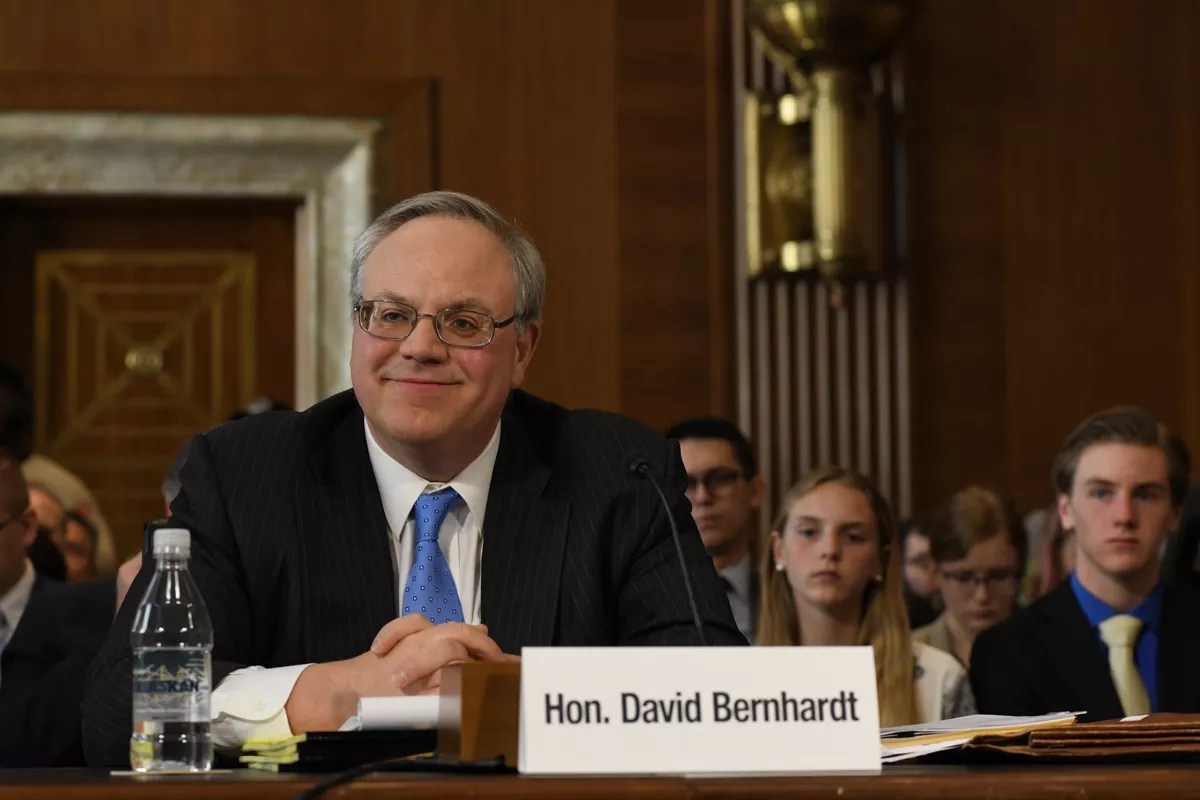
Courtesy of the U.S. Department of the Interior

Audio By Carbonatix
When it comes to ethics, the devil is in the details.
At least it was for David Bernhardt, who was accused of committing ethical violations in his dealings with Westlands Water District while he was Secretary of the Interior. According to a January 19 report from the Office of the Inspector General of the Department of the Interior, Bernhardt, who is from Rifle, didn’t technically commit any ethical violations when it came down to the letter of the law.
“It shows just how swampy Washington can be,” says Aaron Weiss, deputy director for the Center for Western Priorities. “When a smart, savvy lobbyist and lawyer goes in with an agenda and knows what questions to ask so he stays just on the right side of ethics laws, you can do a lot of damage, or, I guess, a lot of help for your former clients.”
Bernhardt represented Westlands in litigation and lobbying before he was confirmed as Deputy Secretary of the Interior in 2017. Just prior to working for the federal government, Bernhardt headed up the Washington, D.C., office of Denver-based Brownstein Hyatt Farber Schreck, where his clients included many in the oil and gas, energy and water industries.
When Bernhardt took over as secretary in 2018 after his boss, Ryan Zinke, resigned in the wake of several scandals related to out-of-control spending and conflicts of interest, Bernhardt worked on matters involving the California-based Central Valley Project, from which Westlands receives water.
The inspector general examined whether Bernhardt helped Westlands secure a favorable, permanent contract with the CVP without disclosing his potential conflicts of interest.
“We did not substantiate the allegations,” the report says. “Rather, we found that to the extent Mr. Bernhardt gave directions, guidance or advice affecting CVP matters, his actions involved policy decisions that were within Mr. Bernhardt’s official discretion to make.”
Bernhardt was allowed to work with the CVP despite his involvement with Westlands for two main reasons. First, under the ethics pledge, state entities like Westlands do not count as former clients because the pledge excludes any “executive agency or other entity of the Federal Government, State or local government.”
Second, Bernhardt did not deal with any particular matters related to Westlands, because his work with the CVP and the California State Water Project was broadly focused on the reduced availability of water in California.
“He didn’t have to work on particular matters involving Westlands in order to make and shape major decisions that would help Westlands,” Weiss says. “He is a smart enough operator – he’s been around the Interior Department enough – to know exactly which levers to pull to help Westlands without ever having to take a meeting with them.”
To Weiss, the inspector general’s report reads as an instruction manual for others hoping to get away with unethical conflicts of interest at a federal level.
“It may be technically legal, but that doesn’t make it right,” Weiss says. Bernhardt did not reply to a request for comment.
From the beginning of his tenure with the Department of the Interior, Bernhardt’s ethics were questioned, as Zinke cameg under fire for stacking the department with staffers who had ties to the oil and gas industry, including Bernhardt.
When Bernhardt took over in 2018, his former lobbying work came under fire during his confirmation hearing. He told senators at the hearing that he intended to stop recusing himself from decisions that could affect former clients once the two years he was required to do so were up in August of that year, arguing that continuing to do so would keep him from completing many functions of his job.
At the time, Bernhardt had the most potential conflicts of interest of any of President Trump’s 31 cabinet members, according to the Center for American Progress. Twenty of his former clients had actively lobbied the Department of the Interior in the last year. Now it turns out that by definition, Westlands didn’t count as one of those clients.
Weiss says it’s not encouraging that the inspector general found no technical wrongdoing. Rather, it shows that Bernhardt was smart enough to get around the rules.
“What it found was a guy who knew his way around the system to skirt his ethical obligations in a way that just fit the letter of the law in his ethics pledge, while clearly violating the spirit of them,” he says. “To me, the most interesting thing in that report was a confirmation that before David Bernhardt was ever nominated to be the deputy secretary, he got confirmation that he would be able to work on California waters.”
The report describes Bernhardt’s questions about whether he would have to recuse himself from all matters involving the CVP or just those specifically related to Westlands. Bernhardt had discussed the potential reach of the conflict of interest during a conversation he initiated with the department’s Alternate Designated Agency Ethics Official before his nomination.
Weiss predicts that this won’t be the last example of Bernhardt’s national political influence, particularly the next time a Republican is president.
“David Bernhardt came out of this far more valuable to his clients than when he went in, and that was always the goal,” Weiss says. “You can see the difference between David Bernhardt and his predecessor, Ryan Zinke: Zinke was a corruptible fool who got caught trying to cash in while on the job. David Bernhardt was always much smarter than that. He was never going to have the CEO of Halliburton in to try and finagle a brewpub out of it. He was just going to do what he needed to do to help his clients, knowing that the moment he left, he would be handsomely rewarded for it.”
A clean slate from the inspector general won’t hurt, either.